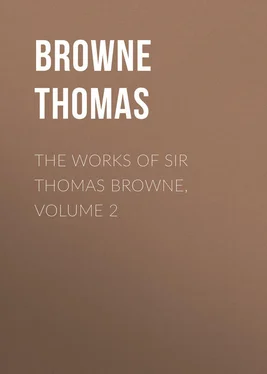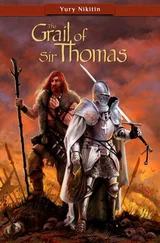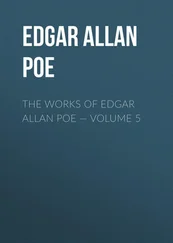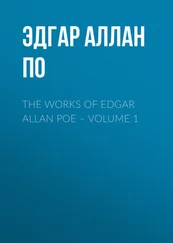Thomas Browne - The Works of Sir Thomas Browne, Volume 2
Здесь есть возможность читать онлайн «Thomas Browne - The Works of Sir Thomas Browne, Volume 2» — ознакомительный отрывок электронной книги совершенно бесплатно, а после прочтения отрывка купить полную версию. В некоторых случаях можно слушать аудио, скачать через торрент в формате fb2 и присутствует краткое содержание. ISBN: , Жанр: foreign_antique, foreign_prose, на английском языке. Описание произведения, (предисловие) а так же отзывы посетителей доступны на портале библиотеки ЛибКат.
- Название:The Works of Sir Thomas Browne, Volume 2
- Автор:
- Жанр:
- Год:неизвестен
- ISBN:http://www.gutenberg.org/ebooks/39961
- Рейтинг книги:5 / 5. Голосов: 1
-
Избранное:Добавить в избранное
- Отзывы:
-
Ваша оценка:
- 100
- 1
- 2
- 3
- 4
- 5
The Works of Sir Thomas Browne, Volume 2: краткое содержание, описание и аннотация
Предлагаем к чтению аннотацию, описание, краткое содержание или предисловие (зависит от того, что написал сам автор книги «The Works of Sir Thomas Browne, Volume 2»). Если вы не нашли необходимую информацию о книге — напишите в комментариях, мы постараемся отыскать её.
The Works of Sir Thomas Browne, Volume 2 — читать онлайн ознакомительный отрывок
Ниже представлен текст книги, разбитый по страницам. Система сохранения места последней прочитанной страницы, позволяет с удобством читать онлайн бесплатно книгу «The Works of Sir Thomas Browne, Volume 2», без необходимости каждый раз заново искать на чём Вы остановились. Поставьте закладку, и сможете в любой момент перейти на страницу, на которой закончили чтение.
Интервал:
Закладка:
Lastly, The ground of the conceit was the figure of this Animal, and motion oft-times both ways; for described it is to be like a worm, and so equally framed at both extreams, that at an ordinary distance it is no easie matter to determine which is the head; and therefore some observing them to move both ways, have given the appellation of heads unto both extreams, which is no proper and warrantable denomination; for many Animals with one head, do ordinarily perform both different and contrary Motions; Crabs move sideling, Lobsters will swim swiftly backward, Worms and Leeches will move both ways; and so will most of those Animals, whose bodies consist of round and annulary fibers, and move by undulation; that is, like the waves of the Sea, the one protruding the other, by inversion whereof they make a backward Motion.
Upon the same ground hath arisen the same mistake concerning the Scolopendra or hundred-footed Insect, as is delivered by Rhodiginus from the Scholiast of Nicander : Dicitur à Nicandro , ἀμφικαρὴς, id est dicephalus aut biceps fictum vero, quoniam retrorsum ( ut scribit Aristoteles), arrepit , observed by Aldrovandus , but most plainly by Muffetus , who thus concludeth upon the Text of Nicander : Tamen pace tanti authoris dixerim, unicum illi duntaxat caput licet pari facilitate, prorsum capite, retrorsum ducente cauda, incedat, quod Nicandro aliisque imposuisse dubito : that is, under favour of so great an Author, the Scopolendra hath but one head, although with equal facility it moveth forward and backward, which I suspect deceived Nicander , and others.
And therefore we must crave leave to doubt of this double-headed Serpent until we have the advantage to behold or have an iterated ocular testimony concerning such as are sometimes mentioned by American relators; and also such as Cassianus Puteus shewed in a picture to Johannes Faber ; and that which is set down under the name of Amphisbæna Europæa in his learned discourse upon Hernandez his History of America .
CHAPTER XVI
Of the Viper
That the young Vipers force their way through the bowels of their Dam, or that the female Viper in the act of generation bites off the head of the male, in revenge whereof the young ones eat through the womb and belly of the female, is a very ancient tradition. In this sense entertained in the Hieroglyphicks of the Egyptians ; affirmed by Herodotus , Nicander , Pliny , Plutarch , Ælian , Jerome , Basil , Isidore , seems countenanced by Aristotle , and his Scholar Theophrastus : from hence is commonly assigned the reason why the Romans punished Parricides by drowning them in a Sack with a Viper. And so perhaps upon the same opinion the men of Melita when they saw a Viper upon the hand of Paul , said presently without conceit of any other sin, No doubt this man is a murderer, who though he have escaped the Sea, yet vengeance suffereth him not to live : that is, he is now paid in his own way, the parricidous Animal and punishment of murderers is upon him. And though the tradition were currant among the Greeks, to confirm the same the Latine name is introduced, Vipera quasi vi pariat ; That passage also in the Gospel, O ye generation of Vipers! hath found expositions which countenance this conceit. Notwithstanding which authorities, transcribed relations and conjectures, upon enquiry we find the same repugnant unto experience and reason.
And first, it seems not only injurious unto the providence of Nature, to ordain a way of production which should destroy the producer, or contrive the continuation of the species by the destruction of the Continuator; but it overthrows and frustrates the great Benediction of God, Gen. 1. God blessed them, saying, Be fruitful and multiply. Now if it be so ordained that some must regularly perish by multiplication, and these be the fruits of fructifying in the Viper; it cannot be said that God did bless, but curse this Animal: Upon thy belly shalt thou go, and dust shalt thou eat all thy life , was not so great a punishment unto the Serpent after the fall, as encrease, be fruitful and multiply , was before. This were to confound the Maledictions of God, and translate the curse of the Woman upon the Serpent: that is, in dolore paries , in sorrow shalt thou bring forth ; which being proper unto the Woman, is verified best in the Viper, whose delivery is not only accompanied with pain, but also with death it self. And lastly, it overthrows the careful course, and parental provision of Nature, whereby the young ones newly excluded are sustained by the Dam, and protected until they grow up to a sufficiency for themselves. All which is perverted in this eruptive generation: for the Dam being destroyed, the younglings are left to their own protection: which is not conceivable they can at all perform, and whereof they afford us a remarkable continuance many days after birth. For the young one supposed to break through the belly of the Dam, will upon any fright for protection run into it; for then the old one receives them in at her mouth, which way the fright being past, they will return again, which is a peculiar way of refuge; and although it seem strange, is avowed by frequent experience and undeniable testimony.
As for the experiment, although we have thrice attempted it, it hath not well succeeded; for though we fed them with Milk, Bran, Cheese, etc., the females always died before the young ones were mature for this eruption; but rest sufficiently confirmed in the experiments of worthy enquirers. Wherein to omit the ancient conviction of Apollonius , we shall set down some few of Modern Writers. That Vipers exclude their young ones by an ordinary passage, as other viviparous creatures. The first, of Amatus Lusitanus in his Comment upon Dioscorides , Vidimus nos viperas prægnantes inclusas pixidibus parere, quæ inde ex partu nec mortuæ, nec visceribus perforatæ manserunt. The second is that of Scaliger , Viperas ab impatientibus moræ fœtibus numerosissimis rumpi atque interire falsum esse scimus, qui in Vincentii Camerini circulatoris lignea theca vidimus, enatas viperellas, parente salva. The last and most plain of Franciscus Bustamantinus , a Spanish Physitian of Alcala de Henares , whose words in his third de Animantibus Scripturæ , are these: Cum vero per me et per alios hæc ipsa disquisissem servata Viperina progenie, etc. : that is, when by my self and others I had enquired the truth hereof, including Vipers in a glass, and feeding them with Cheese and Bran, I undoubtedly found that the Viper was not delivered by the tearing of her bowels; but I beheld the young ones excluded by the passage of generation, near the orifice of the seidge. Whereto we might also add the ocular confirmation of Lacuna upon Dioscorides , Ferdinandus Imperatus , and that learned Physician of Naples , Aurelius Severinus .
Now although the Tradition be untrue, there wanted not many grounds which made it plausibly received. The first was a favourable indulgence and special contrivance of Nature; which was the conceit of Herodotus , who thus delivereth himself. Fearful Animals, and such as serve for food, Nature hath made more fruitful; but upon the offensive and noxious kind, she hath not conferred fertility. So the Hare that becometh a prey unto Man, unto Beasts, and Fowls of the air, is fruitful even to superfætation; but the Lion, a fierce and ferocious Animal hath young ones but seldom, and also but one at a time; Vipers indeed although destructive are fruitful; but lest their number should increase, Providence hath contrived another way to abate it: for in copulation the female bites off the head of the male, and the young ones destroy the mother. But this will not consist with reason, as we have declared before. And if we more nearly consider the condition of Vipers and noxious Animals we shall discover an higher provision of Nature: how although in their paucity she hath not abridged their malignity, yet hath she notoriously effected it by their secession or latitancy. For not only offensive insects, as Hornets, Wasps, and the like; but sanguineous corticated Animals, as Serpents, Toads and Lizzards, do lie hid and betake themselves to coverts in the Winter. Whereby most Countries enjoying the immunity of Ireland and Candie , there ariseth a temporal security from their venoms; and an intermission of their mischiefs, mercifully requiting the time of their activities.
Читать дальшеИнтервал:
Закладка:
Похожие книги на «The Works of Sir Thomas Browne, Volume 2»
Представляем Вашему вниманию похожие книги на «The Works of Sir Thomas Browne, Volume 2» списком для выбора. Мы отобрали схожую по названию и смыслу литературу в надежде предоставить читателям больше вариантов отыскать новые, интересные, ещё непрочитанные произведения.
Обсуждение, отзывы о книге «The Works of Sir Thomas Browne, Volume 2» и просто собственные мнения читателей. Оставьте ваши комментарии, напишите, что Вы думаете о произведении, его смысле или главных героях. Укажите что конкретно понравилось, а что нет, и почему Вы так считаете.












